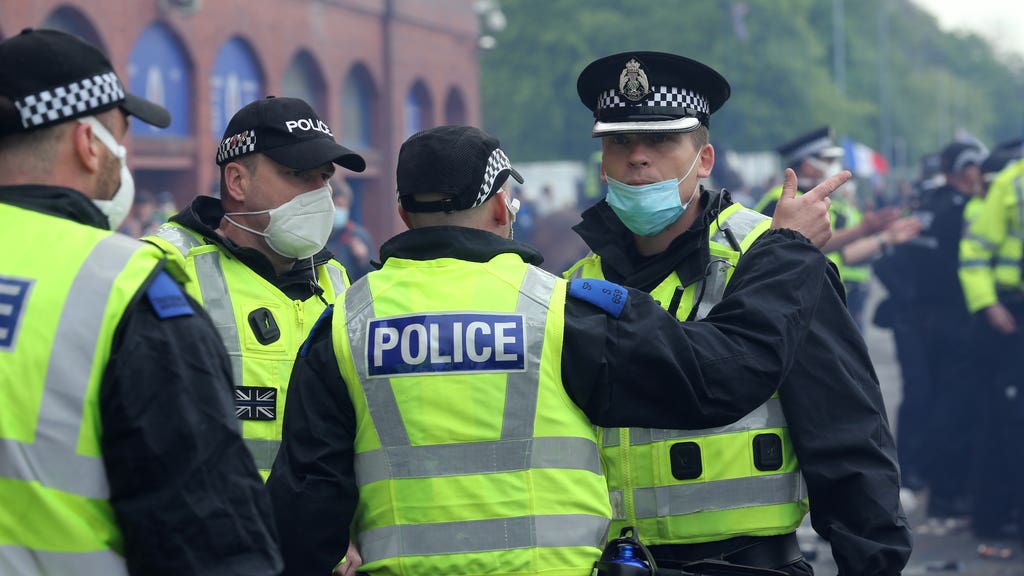Coronavirus rules have been enforced in a “fair and proportionate way” by Police Scotland, the independent advisory group for the emergency powers has concluded.
A new report examining the policing of the Covid-19 restrictions has found that enforcement of the emergency laws has been low compared with wider officer engagement with the public.
Police Scotland’s approach to “engage, explain, encourage and enforce” has been successful as part of the public health measures during the pandemic, according to John Scott QC, the chairman of the independent advisory group for the temporary coronavirus powers.
Research published ahead of the Scottish Police Authority’s next board meeting shows there were 17,978 enforcements by officers between the start of the first lockdown and the end of June 2021, made up of 17,006 fixed penalty notices and 972 arrests.
The estimated number of interventions by police totalled almost 130,000, according to the study by Professor Susan McVie from the University of Edinburgh’s law school.
Police also reported 2221 suspected offences to the Crown Office and Procurator Fiscal Service (COPFS) to be charged – with a peak in April and May 2020.
Of those, 46.7% were due to result in court hearings, while 28.1% were dealt with through “direct measures” such as a fine.
No action was taken in 4.1% of cases and more than a fifth (21.1%) of all charges were still awaiting a decision as of June 30 2021.
The report states: “It is clear that the number of cases (and, therefore, individuals) who were charged as a result of breaches of the Coronavirus Act and associated regulations was extremely small in relative terms.”
A breakdown of charges reveals that 847 cases (38.1%) were suspected breaches of the original lockdown laws introduced from March 27 2020, while 868 were charged under the updated “levels” system introduced from November 2 2020.
There were 36 charges (1.6% of the total) linked to the international travel restrictions and just one person charged in relation to the Aberdeen City lockdown from August 5 last year.
Commenting on the report and his role as a watchdog of the police’s use of the temporary coronavirus powers, Scott said Scotland’s police force had shown a “mature, healthy and confident outlook towards transparency, scrutiny, challenge and accountability”.
He said: “As we approach the end of our work, our eighth report allows us a further opportunity to offer a human rights-based perspective on the use of emergency coronavirus powers by officers of Police Scotland.
“To quote from the report, the ‘four Es approach’ – engage, explain, encourage and enforce – has been successful in helping the public, police and government to view policing of the pandemic primarily as part of a package of public health measures.
“The level of engagement with the public has been high and the use of enforcement has been low.
“The number of people who have been impacted from the point of view of criminal justice contact has been extremely small.
“Policing has sought to respond appropriately and proportionately to public reporting of possible breaches and related demand, without ‘taking sides’ as between those who wanted to see more enforcement and the growing numbers during the pandemic who wanted to see less (or no) enforcement.
“This is part of operational independence, a crucial feature of policing in a democracy.
“Coupled with the appropriate exercise of discretion by individual officers, this helps to explain an overall approach which we have reported on regularly as proportionate and consistent with relevant human rights principles.”
Another section of the report, which is due to be discussed at the SPA’s meeting on Wednesday, revealed the results of interviews with 32 frontline officers about their experiences during the pandemic.
Findings include a rise in incidents relating to mental ill health, with officers feeling they had been “required to fill the gaps for other services” such as the social work and housing sectors.
There has also been a “considerable” impact on staffing levels due to absences because of self-isolation requirements.
One supervisor also warned that the mental health of some officers had suffered and there were currently long waiting lists for counselling.
Follow STV News on WhatsApp
Scan the QR code on your mobile device for all the latest news from around the country


 PA Media
PA Media
























